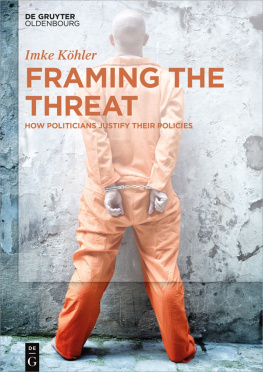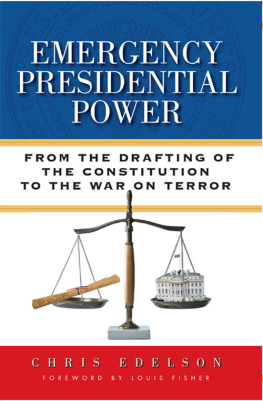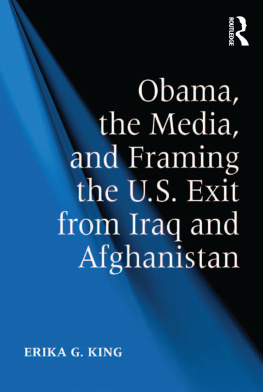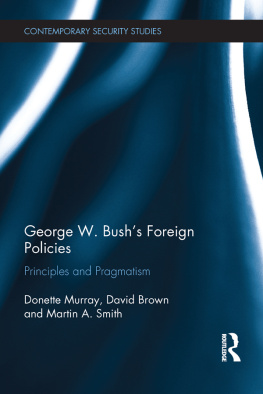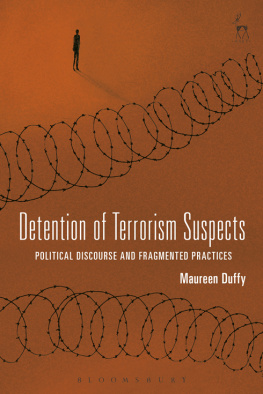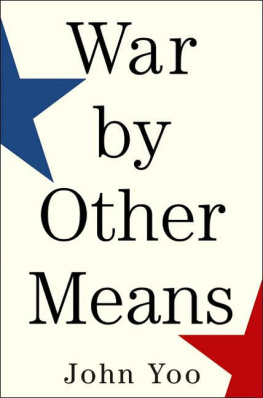Imke Khler
Framing the Threat
ISBN 978-3-11-062214-0
e-ISBN (PDF) 978-3-11-062605-6
e-ISBN (EPUB) 978-3-11-062235-5
Library of Congress Control Number: 2018965032
Bibliographic information published by the Deutsche Nationalbibliothek
The Deutsche Nationalbibliothek lists this publication in the Deutsche Nationalbibliografie; detailed bibliographic data are available in the Internet at http://dnb.dnb.de.
2019 Walter de Gruyter GmbH, Berlin/Boston
Cover image: SeanShot / iStock / Getty Images Plus
www.degruyter.com
With words minds are changed, votes acquired, enemies labeled, alliances secured Through words some of the most potent forces of modern politics are wheeled into motion.
(Rodgers 1987: 4)
Every government policy begins with a story; the choices made by policymakers depend on the stories they tell themselves and others. Their stories have immense power. They create the narrative framework within which U.S. policy is enacted, explained, rationalized, and justified.
(Chernus 2006: ix)
With Thankfulness
In putting down these lines, a challenging and protracted project reaches its final stage. Writing this thesis proved a great effort and has involved a tremendous work load over the years. Like every other researcher, I experienced the demands of painstaking research. But as much as this presented a challenge, it was a personal gain. After all, without this study too many intriguing thoughts would have passed me by unnoticed, things that needed to be considered. There truly is merit in digging deeper.
I am very grateful to all who encouraged me in this endeavor. Due to my professional life, this thesis was a long time coming. I would like to cordially thank my dear friend Dr. Laurenz Grres for his companionship and support. Thank you for your technical assistance and for all the salads, soups, and smoothies that kept my brain running! And I am also very grateful to Inge, Illa, and my friends from church. Many thanks to you all. Your support and prayers kept me going!
Contents
List of Tables
List of Abbreviations
| AI | Amnesty International |
| AP | Associated Press |
| AUMF | Authorization for Use of Military Force |
| CCLE | Center for Cognitive Liberty & Ethics |
| CDA | Critical Discourse Analysis |
| CNN | Cable News Network |
| CS | Copenhagen School |
| CSRT | Combatant Status Review Tribunal |
| DOD | U.S. Department of Defense |
| DOJ | U.S. Department of Justice |
| DOS | U.S. Department of State |
| DTA | Detainee Treatment Act |
| HRW | Human Rights Watch |
| ICRC | International Committee of the Red Cross |
| IIP | State Departments Bureau of International Information Programs |
| IPS | Institute for Policy Studies |
| IR | International Relations (Academic Field) |
| MCA | Military Commissions Act |
| NPR | National Public Radio |
| OLC | Office of Legal Counsel (Justice Department) |
| POW | Prisoner of War |
| UNHR | United Nations Human Rights |
| VFW | Veterans of Foreign Wars |

Part I Research Design
1 Introduction
The aim of this book is to investigate the relationship between language and security and to examine how discourse creates the scope of possibility for political action. In particular, the study scrutinizes how the language use of the U.S. presidents George W. Bush and Barack Obama created political latitude. Their security discourses are analyzed in order to show how their framings of identity, i.e., of the American self and the enemy other facilitated a certain threat construction that shaped the presidents detention and interrogation policies during the War on Terror. By defining what was necessary in the name of national security, Bushs discourse justified the operation of the detention center at Guantanamo Bay and rendered the mistreatment of detainees possible, which otherwise would have been prohibited. This book argues that Bushs securitization enabled legal limits to be pushed and the violation of rules to appear legitimate. President Obama, in contrast, constructed a threat scenario that required an end to rule violations, and the closure of Guantanamo for security reasons. According to Obamas narrative, a return to the rule of law was imperative to keeping the American people safe. Juxtaposing the presidents security narratives in this study allows for a direct comparison and thus illustrates in how far Obama altered framings and arguments, and in part, the policies of his predecessor.
1.1 The Research Question
The War on Terror that was launched after the attacks of September 11, 2001 led to the implementation of security measures that were unprecedented in the history of the United States. The great ideological struggle of our time ().
In 2008, U.S. presidential candidate Barack Obama embedded a different approach to the detention and interrogation policies employed in Guantanamo in his election campaign. He became the voice of a security discourse that advocated the reversal of existing policy, and argued for the closure of the detention center. In fact, immediately after his inauguration in January 2009 President Obama signed an executive order closing the facility. He prohibited enhanced interrogation techniques and restored human and legal rights to detainees who were henceforth protected under the Geneva Conventions. Nevertheless, in sum, Obamas administration failed to fully comply with human rights law: Guantanamo has yet to be closed, indefinite detention continues, as do trials before military commissions. Whereas the Bush administration managed to gain acceptance for a political course that dramatically deviated from established practices, the Obama administration has been unable to fully reverse this course and reestablish what would have been considered normal proceedings before 9/11. This is remarkable in a country so proud of its basis in freedom and democracy in which the concept of the universal rule of law is firmly rooted (: 3) than ever before, this development may initially seem surprising.
This book sets out to address the developments as depicted above and does so by reconstructing the constitutive relationship between language use and policy enactment. The study focuses on these questions: First, how was it possible that the United States a nation that understands itself as ideal in terms of human rights could install the detention center at Guantanamo and implement policies that included Analytically, these questions will be addressed by examining the constitution of identity and threat as put forth in the presidents security narratives. However, although these framings bear the chance of providing legitimacy for particular actions, they have to be largely approved of if they are to unfold political power. Therefore, this book also examines what kind of resonance these narratives provoked from their audience(s) and whether they were able to dominate public discourse.

